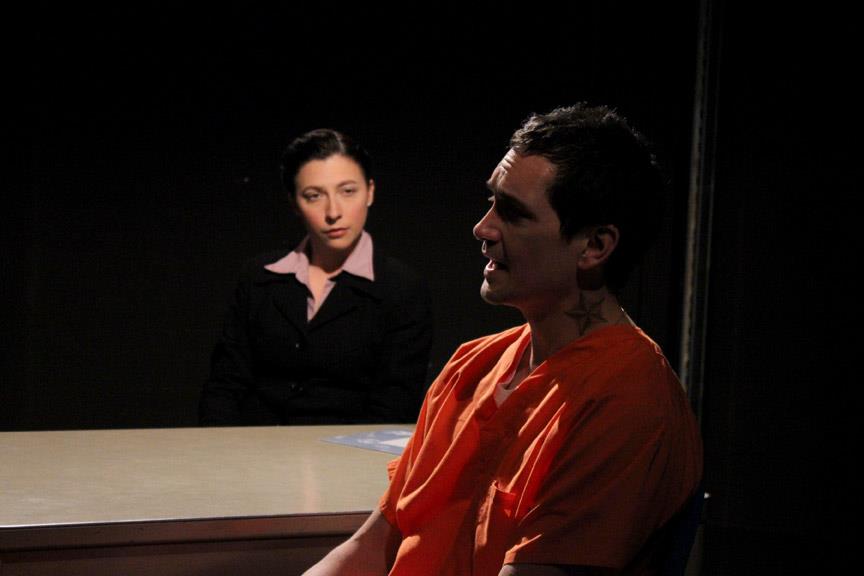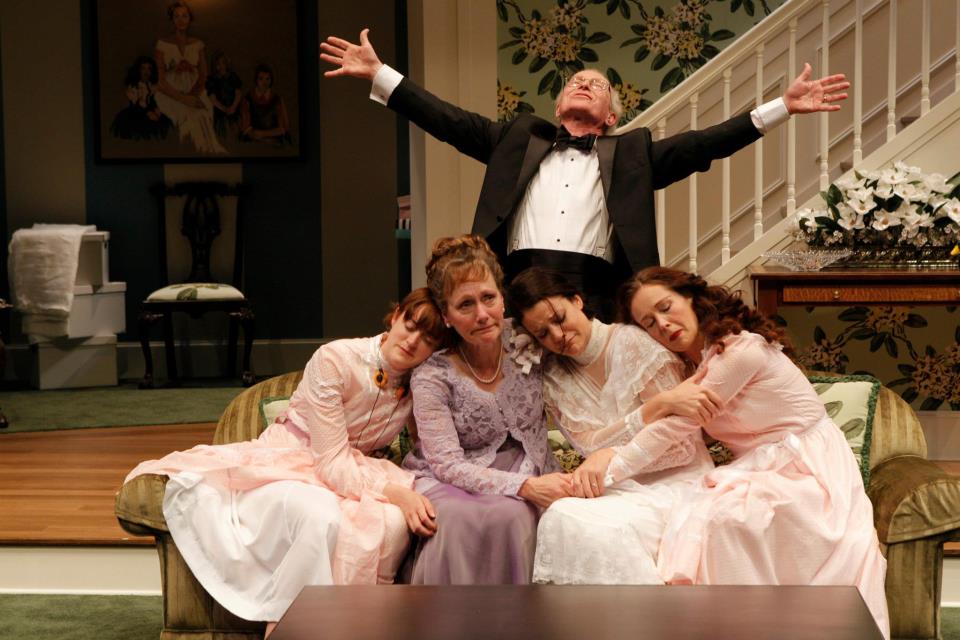Review: “One Slight Hitch” by Lewis Black. Directed by Joe Grifasi. With R. Hamilton Wright, Marianne Owen, Kimberley Sustad, Katherine Grant-Suttie, Kirsten Potter, John Ulman and Shawn Telford. Now through July 8, 2012 at ACT.
Review: “Jesus Hopped The A Train” by Stephen Adly Guirgis. Produced by Azeotrope in association with ACT’s Central Heating Lab. Directed by Desdemona Chiang. With Richard Nguyen Sloniker, Dumi, Patrick Allcorn, Ray Tagavilla, and Angela DiMarco. Now through June 30, 2012 at the Eulalie Scandiuzzi Space @ ACT.
I spent much of last weekend at ACT checking out two of the 4298 shows currently playing there…ACT has wisely decided to turn their huge space into a multi-purpose arts center with not only their own productions on their stages, but dozens of other performances ranging from music to comedy to other theatrical works produced in association with their brilliant Central Heating Lab which gives smaller companies a venue to stage their work. Of course, there is the danger that these visiting works could overshadow the work being done by ACT itself on its main stages…which is certainly the case with the two productions currently running, ACT’s local premiere of comedian Lewis Black’s new play, “One Slight Hitch” and the Central Heating Lab co-production with young theater company Azeotrope and its premiere of Stephen Adly Guirgis’s “Jesus Hopped The A Train”. The “big boy” production is lavishly produced with a big name out of town director (actor Joe Grifasi), the presence of the chain smoking Lewis Black himself, and a very distinguished line-up of local actors headed by R. Hamilton Wright and Marianne Owen. “Jesus” is a tiny production from a tiny, new company with up and coming young actors. Yet, “Hitch” is a goofy, uneven mess and “Jesus” is brilliantly directed, designed and acted, and a must see theatrical event. Ah, the irony of being a good Samaritan!
“One Slight Hitch” does have its charms. Lewis Black has a very distinctive voice, both physically and artistically, and it’s certainly heard in both aspects in this production. You know you could be in trouble when the pre-curtain warm up, (the ‘Welcome to the show and turn off your cell phones’ speech) is pre-recorded by your star playwright and it gets one of the biggest laughs of the night solely based on that famous playwright’s distinctively raspy and outraged voice. Mr. Black’s sardonic world view is also very apparent in the frequently very funny dialogue and the overall tone of the play. But the play itself is pure farce and really a bit out of tone with Mr. Black’s dark persona; it’s definitely more of a screwball comedy out of the 30’s/40’s than a ribald contemporary look at society. “Hitch” is blatantly not contemporary; it’s set in the early 1980’s at the Ohio home of Doc Coleman and his wife Delia as they prepare for the wedding of their daughter Courtney. The couple’s other two daughters and Courtney’s fiance and former boyfriend form the rest of the cast and naturally chaos ensues when that former boyfriend turns up on the doorstep the day of Courtney’s wedding. There’s various catastrophes and much hysteria as the family prepares for the wedding and deals with the unwelcome interloper and naturally includes a lot of slamming doors and numerous sight gags. It’s frequently a lot of fun.
It’s also uneven as hell. There’s more than one clunky joke/bit that doesn’t work and the tone is inconsistent. The play is largely a farce, yet in the last few moments of the play it very abruptly shifts gears and gets emotionally maudlin and overly dramatic. It’s possible (and even recommended) to vary tone in a play but the transitions need to have some subtlety. And, it’s not just the plot…some of the characters are also uneven and diffuse. The youngest daughter P.B. opens the play as the narrator but for no apparent reason; she’s not really given that much to do as the play progresses. The other sister Melanie is apparently only on hand as comic relief as the token “drunken slut” who gets some funny quips but also seems to have wandered in from a completely different show. And, WHY is this play set in the 1980’s? It doesn’t really add much to the show other than offer an excuse to play snippets of classic songs from the era. The entire show just feels…disjointed.
“One Slight Hitch” does have some things to enjoy. It IS frequently pretty funny and the talented cast is having a great time on stage. The set design, by Robert Dahlstrom, is a lovely representation of an upper middle class, midwesterner’s home with enough grand staircases and doors to populate any number of screwball farces. Director Joe Grifasi has an eye for staging funny bits; one of the biggest laughs of the night occurred very early in the night as P.B. introduces us to her parents; it’s a great sight gag.
I’m not condemning Mr. Black or his “One Slight Hitch”; I just think it needs some more tinkering under the hood. It has potential and it is amusing and if you like very slight comedy, with a few theatrical hitches, then you might enjoy this production.

Angela DiMarco and Richard Nguyen Sloniker star in Azeotrope’s “Jesus Hopped The A Train” at ACT. Photo: Jessica Martin
Meanwhile, tucked away in a back corner, (the former rehearsal room now known as the Eulalie Scandiuzzi Space), there’s a completely different kind of play being staged. Azeotrope, the very young theater company created by actor Richard Nguyen Sloniker, playwright/actress/producer Serin Ngai and director Desdemona Chiang to showcase the talent of Asian-American theater artists is staging their second production after last year’s excellently produced “Red Light Winter” which starred Mr. Sloniker as a shy, repressed student coping with an unhealthy love triangle. Stephen Adly Guirgis earned international acclaim for “The Motherfucker With The Hat” last year but his earlier work, “Jesus Hopped The A Train” definitely helped put the playwright on the map with its tightly constructed plot and ear for gritty language. “Jesus” contrasts the fates of two prisoners both interned in New York City’s prison on Riker’s Island: Angel Cruz, a Hispanic man accused of shooting a prominent religious/cult leader and Lucius Jenkins, a man convicted of 8 murders in Florida and currently fighting extradition back to that state. Also along for this “A Train” ride are Angel’s lawyer, a kind prison guard and a not so kind prison guard and while the play itself is a bit too long for its own good, and its themes of faith and redemption are a mite heavy handed, this production is so superbly directed, designed and acted that you can overlook some of the flaws of the script. It’s an amazing production and Azeotrope has established itself as a major small theater company that produces top notch, A list quality theater. It’s a must see production and hugely recommended for all fans of serious theater.
“Jesus” contrasts the two stories of Angel and Lucius and their eventual connection and director Desdemona Chiang expertly guides the actors with precisely staged movements and a careful attention to the rhythms of the play. She’s aided by the unique design of the Eulalie Scandiuzzi Space at ACT, a former rehearsal hall with metal stairs and upper gallery built into the space helping create the illusion of a prison and offering different levels to place the actors. Deanna Zibello’s simple but effective set design consists of a platform with some surprising multiple functions and its expertly lighted by Jessica Trundy to maximize the drama and the setting of the work. The sound design by Jay Weinland with original music by local musician/composer Christian “Lil Kriz” Beeber enhances the gritty world this place inhabits. There’s no fault to be found with any of the work from this talented production team. (Kimberley Newton’s carefully detailed contemporary costumes are also a huge asset.)
But the power of “Jesus Hopped The A Train” relies on the masterful, authentic dialogue of Mr. Guirgis and the superb performances from the five member cast. Patrick Allcorn has the smallest of the roles, as the sympathetic prison guard Charlie and it can be argued that it’s a rather insignificant role as the character only has two minor scenes, but Mr. Allcorn makes the most of his time on stage. His character, Charlie is obviously there as a contrast to the larger role of Valdez, the viciously cruel senior guard who delights in tormenting his prisoners, who’s expertly portrayed by Ray Tagavilla. It’s a tough performance by an actor who’s recently made his mark as a actor who’s expert at playing complicated, amoral and violently prone characters and Mr. Tagavilla, as usual, is very good in this role. I do however have a wish to see him play a role requiring the softer, gentler side of the actor’s character; Mr. Tagavilla is one of Seattle’s most interesting up and coming young actors and I want to see all the various possibilities of his talent…he’s a terrific comedian and we need to see the funny side of Ray Tagavilla…SOON!
Angela DiMarco is another on that short list of terrific Seattle actors who consecutively turn in terrific performances, even when the plays/productions themselves aren’t so great and once again she’s a huge asset to “Jesus” as Angel’s determined but flawed lawyer. Ms DiMarco makes Mary Jane Hanharan a compelling, emotionally complicated character who manages to be both tough and tender without sacrificing any of her power as a professional woman in a very tough world. It’s another positive notch on Ms DiMarco’s increasingly impressive resume.
But, this play really rests on the shoulders of Richard Nguyen Sloniker as Angel and a new to my local theater radar, an actor named Dumi as Lucious Jenkins. Mr. Dumi channels the huge spectrum of Lucious’ personality as the “jailhouse born again man of faith” and expertly makes the character real and challenging and utterly believable. He also manages the difficult task of not falling into the pitfalls of a role that borders on the stereotype (black man as the man of faith preaching the Gospel to those unaccepting) and you BELIEVE in the faith of his character based on the strength of the performance. I think the role is slightly overwritten; by the end of the performance I sort of wished the character would just SHUT UP and die already, but that’s a weakness of the script and not the actor. I want to see more of Mr. Dumi on Seattle stages.
Honestly though, the night belongs to Mr. Sloniker and his deliciously on target work as Angel. It’s revelatory work from this actor who hugely impressed me last year in Azeotrope’s debut production of “Red Light Winter” as the depressed and confused, suburban student caught in a bizarre love triangle and does a 180 degree turn in “Jesus” to portray a tattooed, gritty, slum raised street kid caught up in the criminal justice system. Mr. Sloniker is mesmerizing as a character who’s trapped by the circumstances of his life, despite his obvious intelligence and sensitivity, and powerless to escape a life plagued by a lack of opportunity and faithless life choices. It’s a complicated, highly charged yet nuanced performance that contrasts the outer bravado of Angel’s character with the inner fear and tenderness of a highly sensitive soul. I’ve admired Mr. Sloniker’s work for awhile now but this performance only elevates him to a higher standard of appreciation and a hope to see much more work from this actor. It’s just a terrific performance you can’t miss seeing.
Finally, a quick note on the hidden,or maybe not so hidden themes in “Jesus Hopped The A Train”…to me, this play is not only about the power,or lack thereof, of faith and redemption, but about the relationship between the two main characters and the strong homocentric bond between them. Issues of jailhouse rape and the treatment of sexually disenfranchised prisoners are dealt with in the play, but the relationship between the two main characters is subtle and not blatantly portrayed. It’s also not necessarily sexually motivated, but more emotionally connective between the two men. And, I have to note, that the character of Angel is obviously emotionally conflicted about his emotional bonds with the other characters in the play, both onstage and off. Angel is imprisoned for shooting the leader of a cult that had ensnared Angel’s best (male) friend; enraged by his friend’s treatment, Angel sought revenge and shot the leader. The scenes where Angel describes his friend and their relationship are tender, yet halting, the words of a man who seems very passionately attached to another. And, for all his bravado about a desire to maybe date his female lawyer, the character seems more committed and earnest in his relationships with the men in his life, like his best friend and his complicated connection with Lucious, a man already labeled as a “jailhouse faggot” by the sadistic prison guard Valdez. The homocentric relationships in this play are one of its chief virtues…and open to lively discussion.
Who’s this for? Serious theater lovers who love gripping, gritty theater with strong performances and themes. HUGELY recommended as one of the best productions so far this year in Seattle. Don’t miss it.


















